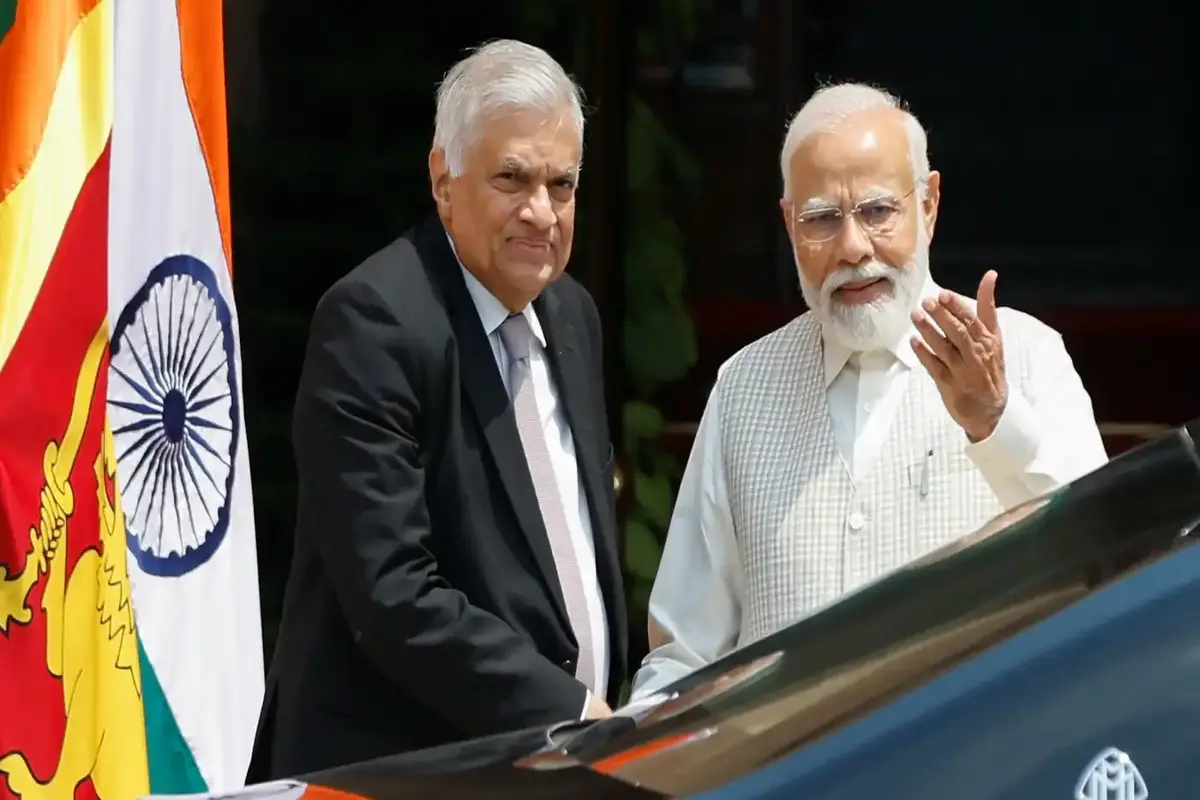
India and Sri Lanka adopted a “vision document” to deepen their economic ties on Friday after Sri Lankan President Ranil Wickremesinghe and Prime Minister Narendra Modi met here.
Wickremesinghe’s visit to India will be his first since taking office a year ago after Sri Lanka’s economic crisis sparked widespread protests and forced his predecessor Gotabaya Rajapaksa to flee. India has played an important role in helping Sri Lanka deal with the crisis.
Modi said after the meeting that the vision document aims to “accelerate mutual cooperation in tourism, energy, trade, higher education and skills development.” He called the document “a vision for India’s long-term engagement with Sri Lanka.” “Today, we adopted a vision document on economic partnerships, whose vision is to strengthen sea, air, energy and people-to-people ties between our peoples…” Modi said.
Modi also conveyed to Wickremesinghe, New Delhi, his hopes of meeting the needs of the Tamil community living in Sri Lanka.
“We hope that the Sri Lankan government will fulfill the wishes of the Tamil people…ensure the livelihood of the Tamil community in Sri Lanka with respect and dignity…We have also discussed issues related to the livelihoods of the fishermen,” Modi said. In his remarks, Wickremesinghe said he expressed “deep gratitude” for Modi’s country’s solidarity and support during “perhaps the most difficult period in our recent history.”
“We believe India’s growth will benefit its neighbors and the Indian Ocean region,” Wickremesinghe said.
The “vision document” adopted on Friday is based on five pillars.
maritime connection. air connection. Energy and power connection. Trade, economic and financial ties, and personal ties.
In terms of maritime connectivity, cooperation in port and logistics development of Colombo, Trincomalee and Kankesanturai is described with the aim of integrating logistics and shipping in the region. It also noted the resumption of passenger ferry services between Nagapattinam in India and Kanke Santhurai in Sri Lanka and the imminent resumption of ferry services between Rameshwaram and Taraimanar.
The document also mentions expansion of flights between Chennai and Colombo, besides exploring connectivity between Chennai and Trincomalee, Batticaloa and other destinations in Sri Lanka. This will, according to the document, “encourage and strengthen investment and cooperation in civil aviation, including augmentation of airport infrastructure at Palaly for greater economic benefits to the people.”
On energy and power connectivity, the two sides plan to “establish a high capacity power grid interconnection… to enable bidirectional electricity trade between Sri Lanka and other regional countries, including those of the BBIN (Bangladesh, Bhutan, India, Nepal) initiative. This has the potential to not only bring down the costs of electricity in Sri Lanka but also help create a valuable and dependable source of foreign exchange for Sri Lanka, the document said.
The document also talks of expediting “implementation of understanding reached” on the Sampur Solar power project and LNG infrastructure, and exploring cooperation in Green Hydrogen and Green Ammonia.”
The two countries will also be working on a multi-product petroleum pipeline from India’s South to Sri Lanka, besides undertaking a “mutually agreed” joint exploration and production of hydrocarbons in Sri Lanka’s offshore basins to develop Sri Lanka’s upstream petroleum sector.
According to the document, the two sides will also “undertake discussions on the Economic and Technology Cooperation Agreement with an aim to comprehensively enhance bilateral trade and investments in new and priority areas.”
“The decision to designate the Indian rupee as the currency of trade agreements between the two countries has created a stronger and more mutually beneficial trade relationship,” the document said. The two sides agreed to introduce “UPI-based digital payments to further enhance commerce and transactions between businesses and the public.”
The two sides also agreed to “leverage India’s digital public infrastructure in line with Sri Lanka’s needs and priorities to provide effective and efficient people-centred services to the Sri Lankan people.”
The two countries also plan to “promote and promote awareness of the ancient places of Buddhist, Hindu and other religious worship in Sri Lanka, Buddhist circuits and Ramayana paths in India, with the aim of promoting tourism,” and are also exploring cooperation between educational institutions.
“Expand cooperation between research and academic institutions in fields of mutual interest, including agriculture, aquaculture, IT, economics, finance and management, health and medicine, earth and marine sciences, oceanography, space applications, history, culture, languages, literature, religious studies and other humanities,” the document said. Wickremesinghe, who arrived in New Delhi on Thursday, had earlier meetings with businessman Gautam Adani, NSA’s Ajit Dvar and Foreign Minister S Jaishankar.

















